Charles Keidan talks to Antonio Zappulla of the Thomson Reuters Foundation (TRF) about how it uses its media and legal expertise to drive systemic change.
CK: You became CEO of the Thomson Reuters Foundation in the last year and much is changing.
AZ: Our strength is based upon three components: the media component, the legal component and the ability to speak as a trustworthy convener to people who do not necessarily talk to each other, like the NGO community, the corporate community, the media community, and so on.
How do you see your relationship with the foundation community?
We work a lot in partnership with foundations. Our parent company, Thomson Reuters, commits £4.5 million every year to our overall budget of about £15 million, so there is a lot of partnership and fundraising involved. The C&A Foundation, now the Laudes Foundation, and the Omidyar Network, for example, support our journalism. In the past, we have worked with the Rockefeller and UN Foundations and, because of our new strategy, we are reaching out to others.
We are an operating, not a grantmaking, foundation – a choice we made because we realise that we offer perfect leverage for philanthropic investments. For example, TrustLaw, our pro bono legal advice platform, costs around £1 million a year, but through it, we are able to leverage about $30 million worth of free legal assistance. We make sure that when a lawyer does pro bono work for an NGO, they are not wasting their time because our staff lawyers have already spoken with that NGO. We also vet the NGOs to fast-track the pro bono activities.
What’s the impact of that work and why is it needed?
Firstly, you are effectively saving $30 million worth of money for NGOs, so they can spend it on the vital work they need to do. Secondly, through the network, we do a lot of legal research, which supercharges the advocacy efforts of a number of organisations, and that has led to significant policy change.
There are three thematic strands to our work: media freedom, inclusive economies and human rights. The services that we use are journalism, media development, free legal assistance and convening initiatives.
Can you give some examples?
We worked with Equality Illinois, a non-profit in the US who wanted to ban conversion therapy on minors in Illinois. Conversion therapy is where LGBT people are subjected to things like electro-shock, icing, cold baths to ‘correct’ their sexual orientation. It has zero medical value and is horrendous in terms of psychological and physical shock. Right now in the US there are only twenty states that ban conversion therapy on minors.
Equality Illinois was campaigning unsuccessfully to ban conversion therapy, so we facilitated a comparative study of a number of jurisdictions in the US and abroad on conversion therapy policies and practices. Using that research, they lobbied successfully, and the state of Illinois banned conversion therapy on minors. This approach of accelerating the advocacy of NGOs through research is something we’ve done globally. Another example is reform of rape legislation in China. Previously, character was taken as part of evidence in rape trials, so if you were a single woman without a committed partner you ran the risk of being viewed unfavorably by the court. Through research facilitated by TrustLaw, we were able to change that. Considering how enormous the female population of China is, that’s a huge impact.
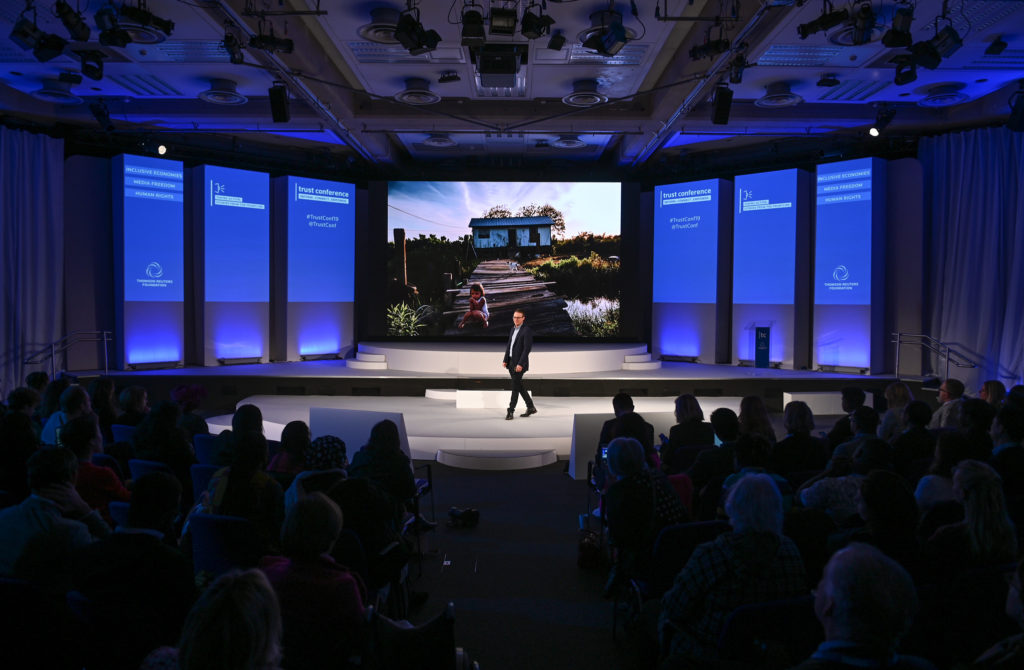
Presentation by New York Times senior editor for photo technology Josh Haner at Trust Conference 2019. Credit: Thomson Reuters Foundation
What does your new strategy comprise?
There are three thematic strands to our work: media freedom, inclusive economies and human rights. The services that we use are journalism, media development, free legal assistance through TrustLaw, and convening initiatives, the biggest of which is the Trust Conference.
With media freedom, we try to strengthen the media ecosystem as a watchdog for democracy and tool for development. We train journalists in ethics and standards of journalism, human rights, anti-corruption and good governance reporting, thereby strengthening the media ecosystem.
We also protect media freedom. We’ve done legal research for organisations like the Committee to Protect Journalists and Reporters Without Borders on how libel and defamation are often used to silence journalists. Through this research, we drew attention to international legislation on freedom of speech and media freedom and how that can be deployed to protect journalists. We’re currently working on a new initiative to provide legal assistance to journalists in countries at risk.
The selling point of our organisation is our unique blend of legal and media capacity to achieve systemic change.
Finally, under the media freedom strand, is research on the future of the profession. We give a core grant every year, the only grant we make, to the Reuters Institute for the Study of Journalism at the University of Oxford, and we work very closely with the Institute to produce research that is pertinent to our overarching media freedom strategy. We’ve trained over 20,000 journalists in the past three decades, mostly in the Global South and we are now asking around 7,000 of them to tell us what challenges they face: online harassment, physical harassment, self-censorship, closing space for media, shifting advertising models, etc. We will unveil the results of this research later on this year.
The second theme is inclusive economies, which focuses on minimising inequality and maximising sustainability and inclusivity. The pillars of our work in this area are changing economic and business models to make them more equitable, the forced labour and anti-slavery work we’ve been spearheading for the past ten years, and data and digital rights – a new frontier of human rights.
What is data discrimination?
Much of the data that pervades our lives depends on algorithms. We don’t know what’s in those algorithms and they might be biased, so there is a risk that some groups are cut off from products and services because of algorithm discrimination.
Another new area within our inclusive economies focus is Environmental, Social and Corporate Governance (ESG) data. A lot of our journalism training is on climate and resilience issues and we’ve also been doing a lot of work on supply chains in relation to forced labour and slavery.
You sometimes work in places and on issues that can be challenging. How do you manage risk?
I think with any foundation that operates internationally there is obviously a level of risk that you have to take into account. With us I think the risk is sometimes higher because we’ve got reporters covering stories all over the world, and we write about human rights issues – so there are risks related to somebody perhaps taking issue with something that we write.
Because we are part of such a big corporation and global brand, the first protection is our name, which has always been associated with independent reporting. Our journalists carry with them a very powerful name. That in itself, I think, is the strongest insurance policy that we could have. But of course, there are always risks.
Does the detention of one of your programme staff in Iran, Nazanin Zaghari-Ratcliffe, show that despite those protections, difficulties can arise?
Nazanin is actually a unique case because she was not in Iran for work. We haven’t worked in Iran for decades. She was there for a holiday visiting her family with her toddler and she was arrested at the airport on the way back and accused of being a spy. We are in touch with the family constantly and extending all the support we can. She’s still on our payroll. We have calls twice a month with the FCO, and regular contact with her husband, Richard.
Even though the circumstances were unique, has it led to an appraisal or rethinking of the operations?
I wouldn’t travel to Iran. I wouldn’t go close to Iran. And none of my team would travel to Iran, not even on holiday at the moment, given the situation. But in terms of operations, we have a presence in Russia, for example. We operated in Hong Kong until recently. Generally speaking, our portfolio of work is so large and so diverse that it actually puts us in a really unique position to operate globally.
Because we are part of such a big corporation and global brand, the first protection is our name, which has always been associated with independent reporting.
Is there ever any tension in your work between your reporting and your advocacy?
We don’t do advocacy ourselves. We do journalism, as well as legal research for organisations, who then use it to do advocacy. That’s an important distinction. We would not, for example, call on a government to decriminalise homosexuality, but we will write about activists calling for decriminalisation, or connect an LGBT rights organisation with a law firm to conduct a legal analysis of decriminalisation in relevant jurisdictions. Our role is to inform on an issue. But we will not campaign.
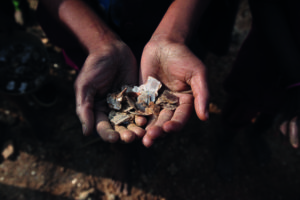
TRF’s investigation into mica mines in India revealed the use of child labour and child deaths going unreported. Credit: Thomson Reuters Foundation
One issue that TRF has been passionate about is ending slavery. Could you say more about that?
We have ten reporters writing on the issue of slavery around the world, pretty much across the map from Thailand to Mexico. We did a massive investigation a couple of years ago on mica mines in India, which revealed the use of child labour and a number of child deaths going unreported. Not only that, but we were able to link these mines to Volkswagen, which subsequently cut ties with that producer.
We also train other reporters to understand the intricacies of reporting forced labour. You need to be able to understand business, to be able to follow the money. You need to understand the difficulties in identifying victims and the cultural sensitivities of what happens when you do. So in addition to writing about the issue ourselves, we shine a light on these issues and train others to do so sensitively and effectively.
On the legal research side, we helped to bring about landmark legislation in the Philippines, the Magna Carta for Domestic Workers, which was passed in February 2013 and set, for the first time, a formal framework of basic rights for domestic workers. We have also helped to create the first rules and regulations governing the working and living conditions of fishers in the Philippines and Thailand.
And you celebrate the work of others having an impact in the fight against slavery through the Stop Slavery Award?
Correct. This year, we’ve made the award much larger. It was originally just for corporates that have made significant efforts to eradicate forced labour from their supply chain. We are now including media, civil society organisations, and advocacy campaigns that have made an impact in this space. We had the ceremony in early 2020 and more than 175 people came representing the diverse ecosystem of the anti-slavery world. We do it because we want to celebrate the champions in this space, not just name and shame the culprits.
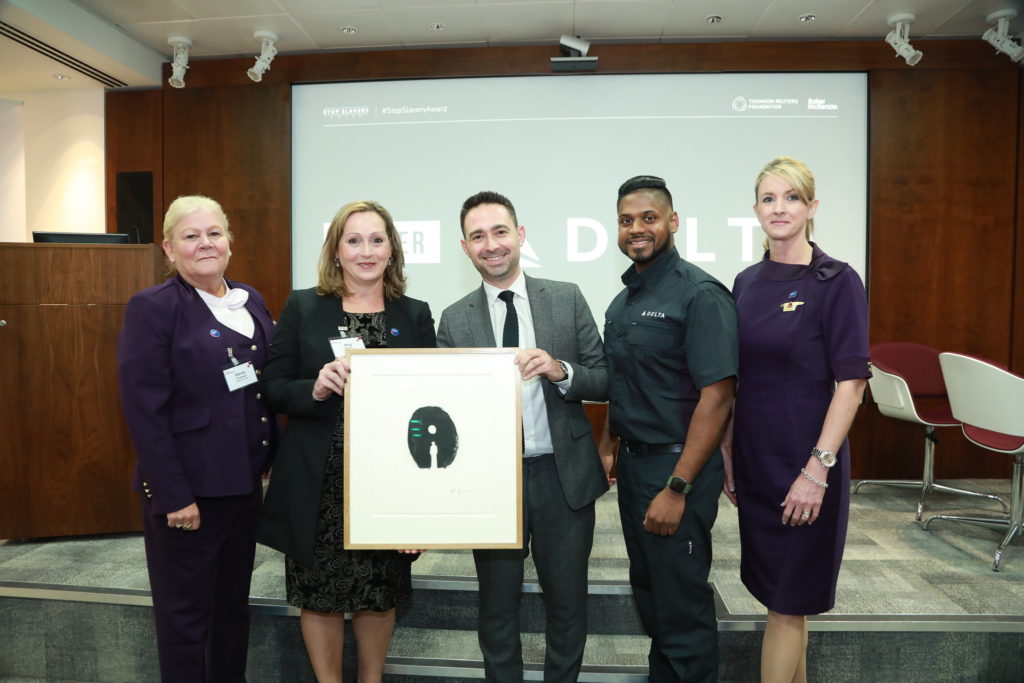
Zappulla with annual Stop Slavery Award winners from Delta Air Lines. Credit: Thomson Reuters Foundation
Your foundation operates very differently to many other foundations. Did it help that you were already working in the organisation?
Massively. I’ve been here for eight years and I know our strengths and where we need to evolve. We announced a new strategy after I took over as CEO last year because I thought it was the best way to leverage the impact of what we do.
We don’t do advocacy ourselves. We do journalism, as well as legal research for organisations, who then use it to do advocacy. That’s an important distinction.
The selling point of our organisation is our unique blend of legal and media capacity to achieve systemic change. As an example, last year at Davos, I was invited to a small gathering where Bill Gates talked about the work their foundation has done on HIV/AIDS in Tanzania. I raised the question of what they were doing about the media and legal environment – if you are a member of the LGBT community in Tanzania, you are automatically breaking the law because homosexuality is criminalised there and the media is extremely homophobic. So how can you reach your target population with anti-retroviral drugs in a country in which it would be difficult for someone to self-identify as gay?
What was his answer?
That they focus mostly on the delivery of the drugs and health. But I talked to Peter Sands, who is the CEO of the Global Fund to Fight AIDS, TB and Malaria, and we announced a partnership with them last year which will be doing legal and media capacity-building in East Africa to begin to change attitudes.
The Gates Foundation attracted controversy over its award to the Indian prime minister for the government’s sanitation work, with many feeling that it endorsed and emboldened a repressive government which is violating minority rights. Was the award a mistake?
I don’t think it’s my place to tell Bill and Melinda Gates whether they made a mistake or not.
Why not?
It’s their event. I wouldn’t like them to tell me how to run my event.
Alliance asked a number of people for their views at the time, but very few were willing to go on record with the criticisms they’d raised privately. Do you think in the foundation world people are unwilling to criticise their peers for fear of letting the side down?
I believe in the value of intelligent compromise, so long as the compromise doesn’t involve your values. I’d rather meet someone half-way in order to go all the way the following day, than not have the meeting to begin with. I believe in the power of diplomacy and people getting to know each other. I would never shut the door if I believe there is potential to implant a seed of change, which is why I find it difficult to comment on that example.
How much should the power of diplomacy be in the hands of private foundations?
If you look at the amount of money that Soros and Bill and Melinda Gates have invested, that’s the reality. Either you completely change the way philanthropy is run or you work with that. Money moves the world, and there’s a lot of money in philanthropy – especially in the US.
Alliance is a philanthropy-focused media publication. How important do you think the work is that we and others do in this space?
It’s extremely important because it connects people. Philanthropy is mainly concentrated in the US and northern Europe, though it’s changing and the next big movement of foundations will come from China and Asia. If I look at the back of your magazine, there’s a number of foundations that I’m already talking to and every edition might give me examples of others in the space. That’s important because we work a lot in partnership. So it connects an ecosystem which is very much fragmented.
I believe in the value of intelligent compromise, so long as the compromise doesn’t involve your values. I’d rather meet someone halfway in order to go all the way the following day, than not have the meeting to begin with.
For the moment, though, philanthropy media is a niche market and philanthropy itself is seen as a vanity project. These are the prejudices that the sector faces. Impact will foster a stronger understanding of the sector – that’s why the Bill and Melinda Gates Foundation is such a visible example.
Niche media also faces challenges if you look at it in the context of the whole media industry. Big players are shutting down and advertising space is shrinking. The sector has been completely disrupted, and if you are a player in a niche space you are more at risk than others. With the coronavirus, companies are likely to face financial constraints and advertising spending will be the first thing to be hit. That’s how the media suffers, and niche media suffers even more.
What are the best entry points for foundations who want to engage with your work?
Understand our three focus areas – media freedom, inclusive economies and human rights, and then start a dialogue! We don’t work with templates, it’s always customised. When the UN Foundation introduced the Sustainable Development Goals, they realised that there was a complete lack of understanding of what SDGs stood for. So, to help them spread awareness, we trained around 600 journalists in 80 countries to help them convey what the SDGs were and what they meant for the countries in which they were operating. That project generated by conversations with the UN Foundation. I see us, as I said, as this interconnection of legal and media capacity to achieve systemic change.
In light of COVID-19, the online version of this interview has been updated. The original version of this interview was published in the June 2020 print issue of Alliance magazine.

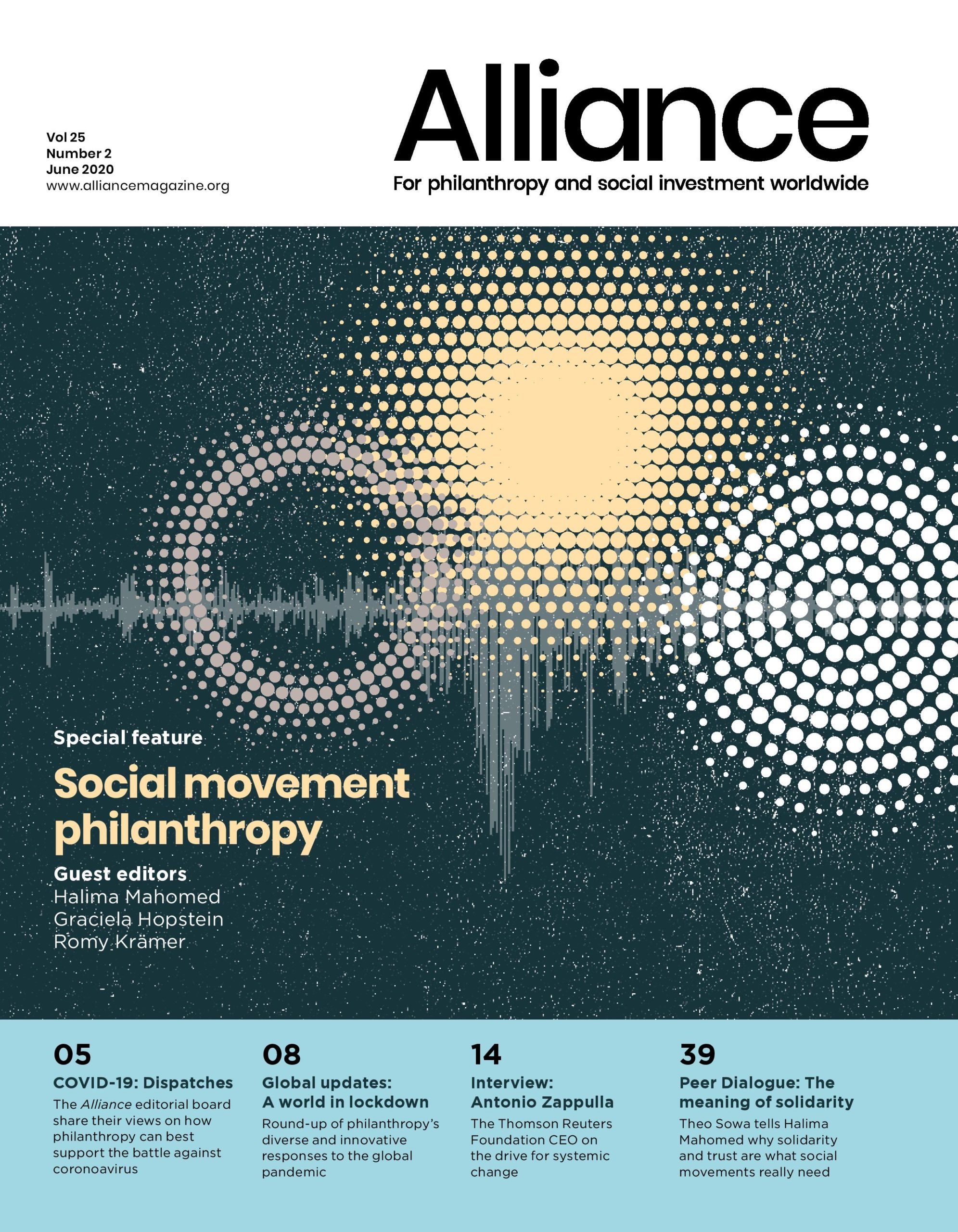
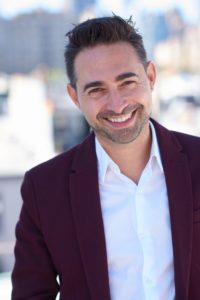





Comments (0)